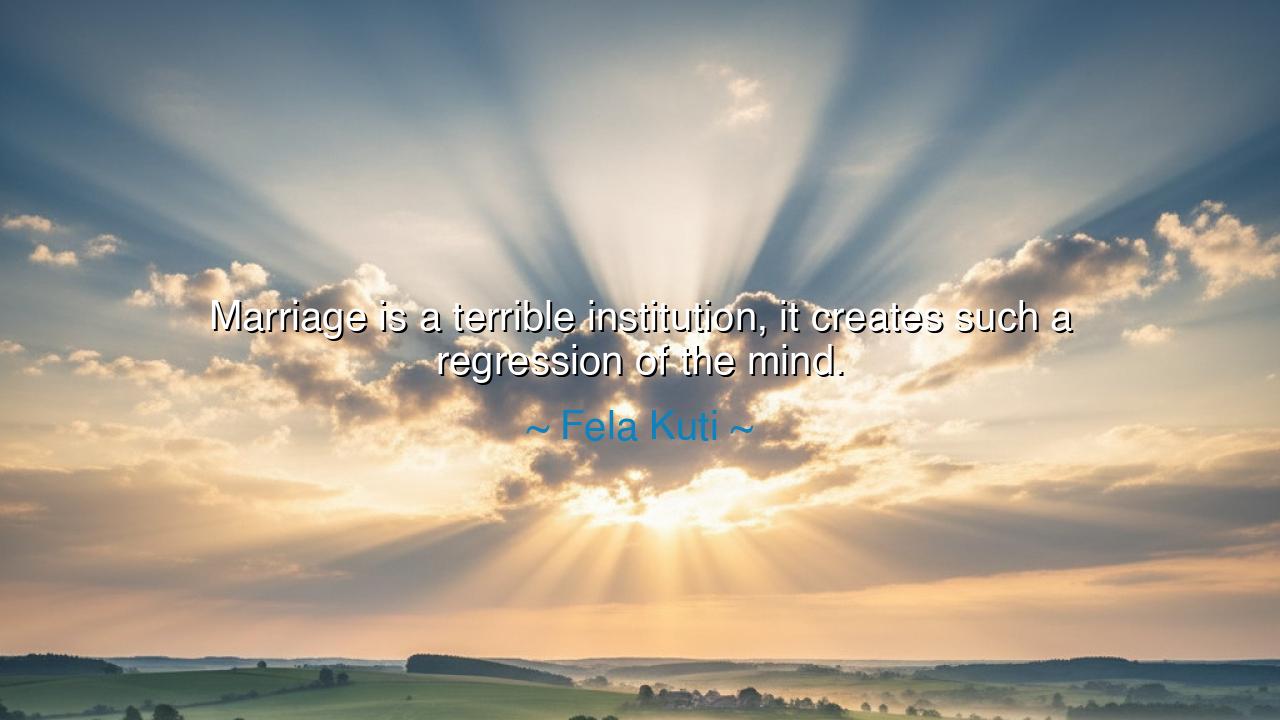
Marriage is a terrible institution, it creates such a regression






Fela Kuti’s words fall like a hammer against tradition: “Marriage is a terrible institution, it creates such a regression of the mind.” Here is no soft lament, but a fierce indictment, born of a man who rejected many of society’s cages. In his cry we hear rebellion, not against love itself, but against the chains that customs, laws, and expectations fasten around it. For Fela saw marriage not as a union of free souls, but as an institution that too often bends the spirit, narrowing the mind, and suffocating the flame of individuality.
The ancients themselves warned that every institution, no matter how noble its origin, could harden into tyranny when stripped of its spirit. Marriage, in its highest form, was meant as a bond of mutual aid and joy, a union of hearts walking side by side. But as centuries passed, it became entangled with property, power, and rigid rules. In many lands, women were treated not as partners but possessions, their voices silenced, their destinies bound. Thus what was meant as companionship often became submission, and what was meant to liberate two souls often imprisoned them instead. Fela, fierce in his devotion to freedom, railed against this very corruption.
Consider the story of Simone de Beauvoir, the philosopher who also questioned the chains of marriage. She chose never to marry, even while sharing a lifelong bond with Jean-Paul Sartre. For her, the institution of marriage in her time meant dependency, inequality, and the erosion of freedom—what Fela called “regression of the mind.” Like him, she believed that love should be chosen freely each day, not mandated by contract or enforced by tradition. Her life stands as a living parable of his words: the refusal to surrender thought, identity, or liberty to an institution that sought to diminish them.
Yet Fela’s cry does not mean that love itself is false. It is the institution—the rigid scaffolding built by society—that he condemns. He saw how it forced conformity, how it demanded obedience to roles that stifled creativity and dulled the intellect. In his world, where colonial systems and cultural expectations already sought to control the African spirit, he viewed marriage as yet another prison, one that masqueraded as respectability but in truth demanded submission. Thus, his rebellion was both personal and political: to reject marriage was to reject another tool of oppression.
The regression of the mind he speaks of is profound. When one enters a structure that demands sameness, obedience, or the surrender of dreams, the fire of the mind begins to dim. Imagination shrinks, and the daring to question is replaced by the compulsion to conform. Many, in seeking the security of institution, lose the wildness of vision. Fela warns us that such regression is not only personal but societal—for when too many minds are subdued, a people lose their power to create, to resist, to be free.
From this sharp lesson, we must draw wisdom. The teaching is not to despise all unions, but to guard against any bond—whether called marriage, tradition, or custom—that demands the death of the spirit. If one is to love, let it be in freedom, not in chains. If one is to commit, let it be as equals, not as master and servant. And if one is to join lives, let it be in a way that sharpens the mind, fuels the imagination, and enlarges the soul, rather than shrinking it.
Therefore, let the seeker of wisdom act. Do not enter into any institution blindly. Question its rules, test its spirit, and ask whether it lifts you higher or casts you lower. Do not surrender your fire for the comfort of convention. Instead, build unions—whether in marriage or in friendship—that nourish thought, that stir growth, that inspire courage. In this way, you honor the spirit of love without betraying the freedom of the mind.
Thus Fela Kuti, prophet of rebellion, leaves us with a stern warning: marriage, as it is too often shaped, can enslave the mind. But love, if freed from chains, can exalt it. The lesson is clear: guard your freedom, guard your mind, and let no institution—however ancient—rob you of the fire that makes you fully alive.






AAdministratorAdministrator
Welcome, honored guests. Please leave a comment, we will respond soon